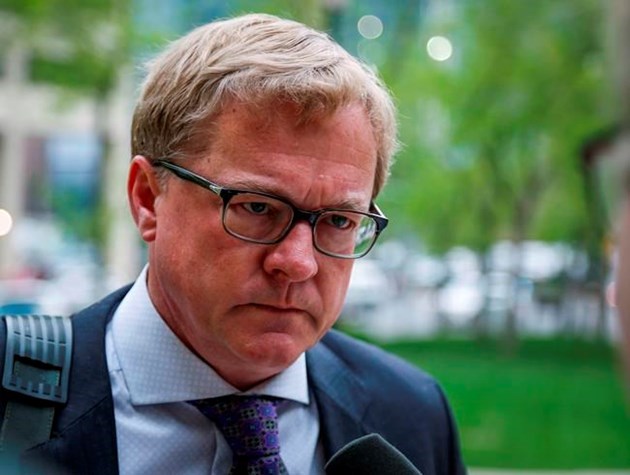ST. PAUL, Alta. — Alberta's education minister apologized Thursday after learning an online social studies course asked students about the positive effects of residential schools.
Students were asked: "A positive effect of residential schools was?" The four multiple choice options listed were: that children were away from home, they learned to read, they became civilized and they were taught manners.
The question prompted a complaint from a student taking the course from the St. Paul Alternative Education Centre. A photo of the question was posted online Wednesday and was met with outrage.
"It's such an offensive matter," Education Minister David Eggen said Thursday after an event in Bon Accord, Alta. "For this kind of material to still be floating around in 2018 is just beyond the pale and quite frankly it's the responsibility of all teachers and principals and school boards to make sure it doesn't happen.
"I want to sincerely apologize to this student, their family, and anyone else who may have been exposed to this insensitive resource. There is no excuse for it and there is no place for it in our schools."
The province has ordered school divisions to thoroughly review all courses offered to ensure they don't include insensitive material.
"The legacy of residential schools is a dark period in our history, and we must journey together toward reconciliation," said Eggen. "It is vital that this take place in a way that honours and brings awareness to the experiences of residential school survivors."
The student did not immediately respond to an interview request.
The Grade 11 social studies course is advertised as exploring topics including First Nations, the development of modern-day Canada and Canada's cultural diversity.
Glen Brodziak, superintendent of the St. Paul Education Regional Division, issued an apology on the school website.
"We are removing the inappropriate content from the resources we use to teach. We accept and take full responsibility for the use of this inappropriate material and for that we are deeply sorry," said Brodziak.
He said it's unfortunate that teachers didn't catch the reference while reviewing the material handed out to students.
"At the end of the day, I still take responsibility but it was a pre-packaged course that is available today. You could sign up for this course today and it would be there," he said.
"The principal has reached out to the family. We've also reached out to the four First Nations that we serve."
The director of the National Centre for Truth and Reconciliation in Winnipeg said he's not surprised that a question like that could still pop up. Ry Moran said there are still plenty of Canadians "clinging to the hope that this was generally a well-intentioned system that had a few bad apples."
"The evidence runs completely contrary to that though," Moran said.
About 150,000 First Nations, Inuit and Métis children were taken from their families and forced to attend government schools. The last school closed outside Regina in 1996.
The Truth and Reconciliation Commission heard graphic testimony from survivors who detailed physical, sexual and emotional abuse. The commission estimated at least 6,000 children died at the schools.
Alberta needs to order a comprehensive review to ensure this kind of thing doesn't happen again, Moran said.
"Education is key in this and educating educators is very important ... helping educators themselves teach this material," Moran said.
"The other thing that's really important as well is recognizing that question could be very harmful, could be very hurtful to people whose family members attended those residential schools."
— Bill Graveland, the Canadian Press



